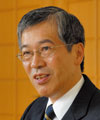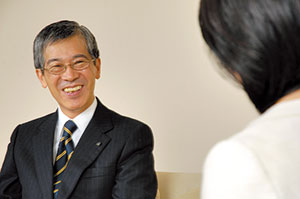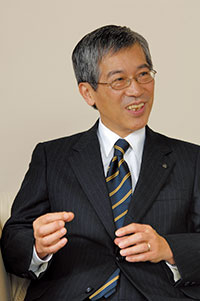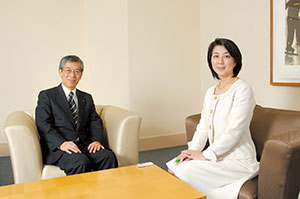 |
|
|
|
|
|
View from the Top Vol. 7, No. 5, pp. 1–4, May 2009. https://doi.org/10.53829/ntr200905tp1  Organizational Strength and Technical Expertise: The Keys to Maximizing Contributions to Society through Information and Communications TechnologyOverviewAkinobu Shigeki, Senior Executive Vice President and Representative Director of NTT DATA CORPORATION, has been at the front lines for twenty years as a project manager. We asked him to tell us about NTT DATA’s plans to expand its systems integration skills with an eye to the future and to establish a working environment that can drive the organization in a rational and efficient way. Now is the time to return to basics and build up corporate strength—NTT DATA’s three-year medium-term management strategy, which began in 2007, is approaching the end of its period. Is the plan progressing smoothly? We had two main objectives at NTT DATA with the aim of becoming a revolutionary and advanced company: shift from an emphasis on quantity (sales) to quality (in the way we do business and pursue value-creation businesses) and improve our profit margin and degree of customer satisfaction. In this regard, we have been lowering our cost rate while maintaining the quality of the systems and services that we provide, and we have been reducing sales and management expenses by one percentage point annually according to plan. These efforts have put us on the path to achieving our target of a 10% profit margin. Furthermore, with the aim of becoming number one in customer satisfaction, we have been listening to our customers closely to determine their needs and wants. At the same time, global economic conditions and the market have changed drastically since last fall. We are therefore entering a period in which we must establish a clear direction to respond to this crisis appropriately and to fulfill our role of meeting the needs of our customers. In particular, there are three areas that we need to give special attention to while searching for the right direction. First, we must become more competitive in systems integration (SI); second, we must revise our software development style; and third, we must strengthen our project management skills. —They all seem important, but which of these three areas of improvement is most critical? Actually, they are all interlinked: we could not have one without the others. The biggest difference between NTT DATA and other companies in the NTT Group is that we provide individual customers with products that they desire in an a la carte fashion. To reduce costs under such a business model, it is important that we find a way to rationalize the creation of a la carte products. Let me explain this in a step-by-step manner. In recent years, “SI” has also come to mean service integration, but here, I will use it in its traditional meaning of systems integration. Improving our basic SI skills is the same as improving our competitive strength. For example, product development consists of the processes of design, production, and testing. First, in the upstream design process, a plan to sufficiently satisfy the requirements defined by the customer is proposed, but that plan must be evaluated to determine whether the product in question can be designed in such a way. Here, we are working to improve the quality of design specifications by researching methods for scoring and evaluating the quality of requirement definitions to replace conventional methods that have depended on the personal experience of project managers. Next, in the midstream production process, we must change the way we develop software. Unless we have a way to correct all defects in source code created by software developers, we will not be able to improve the quality of programs. But checking code by visual inspection or other manual methods requires a huge amount of time and labor. To solve this problem, we need to research ways to automate code checking and code creation. Finally, in the downstream testing process, deciding up to what point testing should be done is not a problem in particular, but testing must be performed accurately just the same while taking the service launch period into account. Today, with the importance of computer systems increasing, a way must be found to expand the range of tests that can be automated to increase efficiency and prevent errors from being missed. Software development has traditionally been dependent on individual skills and a large number of software developers, but if we can change the way we develop software by automation, for example, we should be able to reduce costs, labor, and time and improve the degree of customer satisfaction as a result. In addition, the most important thing in making these projects proceed in a rational and efficient manner is the existence of a project manager. The role of a project manager is to set up procedures and establish an environment that can drive work and the organization forward in a steady manner. It goes without saying that the bigger the scale of a project, the greater the need for a veteran project manager with extensive experience and skills. And of equal importance is the establishment of an information and communications technology (ICT) platform. That is to say, the problems that we survived in the past through the brute strength of system engineers should now be handled in a systematic way. I personally worked as a project manager for twenty years up to the age of 55, and when I began that job, there was no such word as project manager. There was, however, a real need for some kind of overall supervision and control at that time given the severe working conditions of system engineers for whom it was said that 35 years old was the physical limit. It’s also been more than ten years since the need for project managers has come to be recognized by society itself, and today, in an age that could not have been predicted, the know-how of project managers that have extensive experience to survive these hard times must be shared to establish solid organizational and technical skills, and it is imperative that we face work in a rational and efficient manner.
A cooperative frame of mind and a geek-like mentality—From the viewpoint of a vice president that supervised staff in the field for many years, what is important when competing with other companies in the same business sector? First, I would say a cooperative spirit in the sharing of company know-how. In short, working together with other entities that are participating in a certain project can improve the degree of customer satisfaction. For example, the know-how that we possess is, of course, important to us, but if we are unwilling to share it, we isolate ourselves from the rest of the world. On the other hand, disclosing all of our know-how prevents us from protecting our profit. Each company must ascertain that part of its know-how that should not be disclosed to the outside and that part that should be released and shared with society. And for know-how that should be fully consolidated, an appeal should be made throughout society for the sharing of technology and research results, and a direction that contributes to society should be taken. Six information technology (IT) vendors including NTT DATA began preparing non-functional requirements last year. As you probably know, the omission of non-functional requirements can lead to design changes and unplanned system interruptions. At present, non-functional requirements are being broken down into 200 items divided into the six categories of performance, usability, security, extensibility, operability, and portability. The definitions of these items and categories are also being consolidated and organized into a menu format. I am convinced that interacting with peer companies in this way can help improve customer satisfaction. Another important attribute here is to approach one’s work with a geek-like mentality. An engineer that is obsessed about his or her immediate work may not always be sensitive to social trends. But that is not to say that approaching work with the attitude of a geek is always a bad thing. The mentality of losing oneself in work and loving one’s work is, in one sense, an essential element of the engineering process. At the same time, it is important to have other viewpoints that take into account social trends. I would like NTT DATA employees to approach their work with both of these mindsets.
Embracing a grand ambition and formulating a detailed plan—There seem to be high expectations for R&D to provide for disparate fields. Well, today, ICT has become an indispensable part of our daily lives. If the provision of earthquake information or weather information were suddenly halted, I think it would be something we would not forget, but if an ICT platform such as one for banking systems or traffic control were to stop operating normally, the result would undoubtedly be social chaos as well. To maintain social stability, importance must be attached to the continuation of basic research in the R&D process. However, the worldwide recession is also affecting R&D, and the trend today is to reduce R&D expenses. Despite this difficult research environment, I would like to have researchers embrace the grand ambition of contributing to society through research. The Austrian-born economist Joseph Schumpeter stated that capital, labor, and innovation were essential to economic development. I believe that it’s R&D that takes on the burden of innovation. For example, NTT has become a world leader in Next Generation Network (NGN) technology, which will make high-quality videoconferencing a reality. Such a service will help to save energy by reducing the distances that people travel and thereby help to preserve the environment. We could explore the potential of the NGN without reaching its limits, but I would like to see us also involved in other R&D fields targeting social phenomena like the global environment and aging society.
—What is the key to realizing a plan? What advice would you give from the stance of a project manager? With regards to long-term activities, simply establishing a plan for a lengthy period will not prevent a complacent attitude from developing after one or two years. Whatever it is that you want to accomplish after one year should be established as a target, and a detailed plan should be formulated concerning the processes you will use to achieve that goal. In this way, even small problems can be uncovered on a day by day basis. It is also important to talk to people about your ambitions. If you talk to the people around you, your words and deeds will be followed, which can have the unexpected effect of propelling you toward success. Interviewee profileCareer highlightsAkinobu Shigeki joined Nippon Telegraph and Telephone Public Corporation (now NTT) in 1973. He has held many executive posts, some of them concurrently. He became Senior Vice President & Director and Senior Executive Manager of the Fourth Public Administration Systems Sector of NTT DATA CORPORATION in 2001, Senior Vice President & Director, Deputy Senior Executive Manager of Public Administration Systems Sector of NTT DATA CORPORATION in 2003, and Executive Vice President and Senior Executive Manager of the Public Administration Systems Sector of NTT DATA CORPORATION in 2005. He took up his present position in June 2007. |
|










